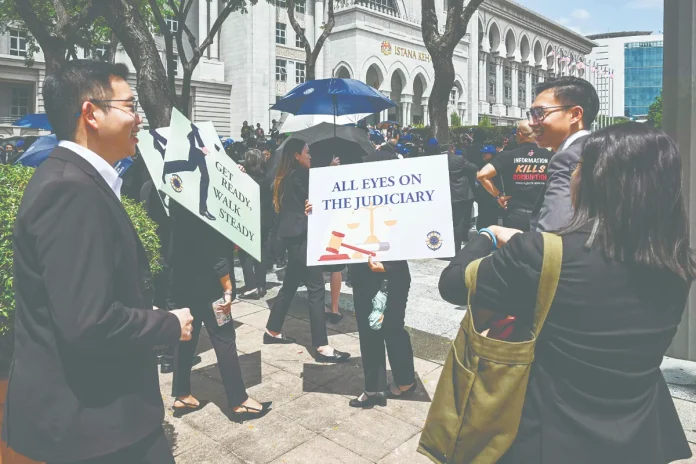With only 189 passes, Malaysia’s Certificate in Legal Practice exam sparks debate on fairness, equality, and the future of legal education.
THIS year, only 189 candidates passed the Certificate in Legal Practice (CLP) examination, the lowest number in the past five years. This figure has raised eyebrows and questions alike, prompting a closer look at possible underlying causes.
Is the persistent low passing rate due to the incapability of Malaysia’s law graduates to achieve that 40% passing threshold per subject or does it point to a deeper issue of an institutional imbalance within the framework that systematically disadvantages particular groups of aspiring lawyers?
Tale of two pathways
In Malaysia, the road to becoming a lawyer is not the same for everyone. Graduates from public universities such as UM, UKM, IIUM, USIM and UITM are exempted from the CLP exam and may proceed directly to their nine-month pupillage.
In contrast, those from private universities (as listed on LPQB’s “List of Universities”) must sit for this notoriously difficult qualifying exam before their pupillage. This dual-track system immediately raises questions of equity.
ALSO READ: Concerns mount over lower passing mark in final exams
Public university students can qualify as lawyers after completing their four-year programmes. Even if they fail one or two of their CLP subjects along the way, they can simply retake those papers.
Meanwhile, private university graduates must sit for all five subjects of the CLP papers and if they fail more than one, they must retake the entire exam, offered only once a year.
This means even strong candidates who pass three out of the five subjects face an additional year of delay, financial strain and emotional toll.
The real problem
It is easy to dismiss the low passing rate by saying that CLP candidates simply aren’t good enough for the exam.
But let’s be realistic. Not all these students can afford to study abroad or pursue the Bar in the UK, where the passing rates are much higher. Most CLP candidates are middle-class Malaysians who are unable to afford to study overseas or are not fortunate enough to secure a spot in public universities.
They attend private institutions, often working part-time to support themselves, and still strive to meet the same legal standards as everyone else.
Even among those who managed to pass, whether with a full or conditional pass, many are also top scorers from their top-tier programmes, such as the University of London or other prestigious law schools.
It makes one wonder how these high-performing students, who excelled in internationally recognised degrees, often barely scrape with a “P” (40%) in most CLP subjects.
When only 189 out of thousands pass (with 157 others on conditional pass), the question we must ask is: Is this exam really assessing legal competence or has it become a gatekeeping mechanism?
Question of intent
The official narrative is that the CLP maintains the quality and integrity of the Malaysian Bar.
But if the goal is to ensure high standards, why are public university students not required to sit for the same test? And if they did, would they all pass?
It is also worth asking whether the CLP’s rigidity serves to limit the number of practising lawyers rather than to elevate standards.
An example of unfairness
Consider a recent case in which a law graduate from a private university was barred from sitting for the CLP exam because his pre-university qualification was considered insufficient as determined by the LPQB.
Ironically, the same qualification once earned him an offer from IIUM, a public university that exempts its students from the CLP exam entirely.
If he was “qualified enough” for IIUM, why is he now “unqualified” for the CLP?
This contradiction exposes the inconsistencies and even the absurdities of our current system.
Time for honest reflection
Malaysia must ask itself: What are we really testing through the CLP? Are we measuring competence or perpetuating inequality?
If the purpose is to ensure quality, the same standard should apply to all, not just those from private institutions.
Recently, Malaysia may be heading in the right direction by exploring the implementation of a Common Bar Course, where all public and private university law graduates would have to complete a three-year law degree and then sit for the same qualifying examination together.
However, the question remains: Will this reform face resistance or setbacks that will make implementation difficult?
Too often, discussions about the CLP turn personal, as if questioning the system means targeting certain groups or universities; it is not.
This is an issue with our legal education system that requires attention, as it affects fairness and opportunities for all Malaysians.
The LPQB must observe clearly and honestly, for it raises serious questions about equality, access and meritocracy in our system.
Until these disparities are addressed, many aspiring lawyers will continue to ask the same painful question: “Is it really that tough to be a lawyer in Malaysia or is the system just designed to make it so?”
Comments: [email protected]










